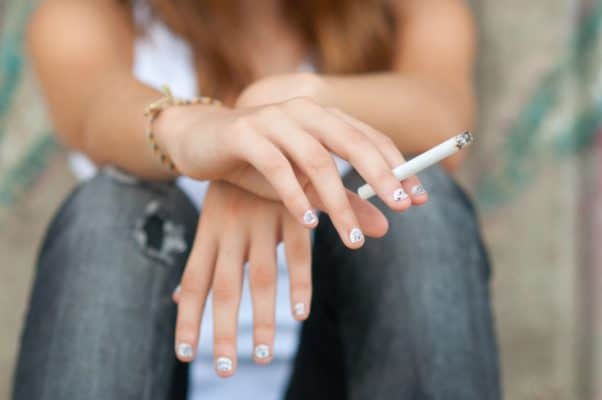Our daily habits can play an important role in preventing acne whether we realize it or not. It’s not just about how often we wash our face or what products we use that is important. Skin care can be affected by more than you think, from what we eat, how much we sleep, our emotional health, and even the pollution in the air.
You might be experiencing acne on a regular basis or once in a blue moon. But if you’re not already taking active steps towards preventing acne, we’re here to give you 5 healthy habits that you can easily implement in your daily life.
Habit 1: Get enough sleep every day
We all know how important sleep is, yet it’s usually the first thing we give up when we don’t have enough time on our hands to take care of our busy schedules. In fact, the average duration of sleep has seen a downward trend in recent times while the prevalence of sleep disorders has significantly increased.
According to the Archives of Dermatological Research, not getting enough sleep may cause acne. This is partly due to the increased production of stress hormones than can occur In response to sleep deprivation (SD). Other studies have found that stress may be a worsening factor for acne. Therefore, it’s important to make sleep a priority as it can play an important role in acne development and exacerbation.
The Centers for Disease Control and Prevention (CDC) recommend 7 or more hours of sleep per night for adults. Fixing a sleep schedule can take 3 to 7 days. So, you may be able to see the benefits after a week.

Habit 2: Protect your skin from pollution.
Pollution is everywhere. Depending on your daily activities, your skin may be exposed to air pollutants for up to 24 hours in a day. The World Health Organization (WHO) states that more than 90 percent of the world’s population lives in places where air quality exceeds WHO guideline limits.
In a scientific board meeting in 2015, Eurasian experts discussed and concluded the following:
- Inflammation plays a critical role in the development and worsening of acne.
- Air pollutants, such as polycyclic aromatic hydrocarbons, can induce an inflammatory response in the body.
- Ozone (O3) in combination with air pollutants and UV radiation can disrupt the skin’s natural barrier function and contribute to acne.
Having a proper skin care routine can help curb the effects of air and UV pollution. Experts recommend washing your face twice daily with a mild cleanser and removing any makeup before going to sleep. They also recommend applying sunblock with adequate UV protection every 3 to 4 hours. Emollients can be used to moisturize the skin and restore its natural protective functions.
Habit 3: Eat antioxidant-rich foods.
Increased oxidative stress is considered one of the contributing factors to acne development. Various factors including diet, lifestyle choices, pollution, and radiation exposure can all contribute to oxidative stress.
A study from the HSOA Journal of Clinical Dermatology and Therapy found that oxidative stress triggers inflammatory changes in hair follicles and sebaceous glands. Inflammatory changes can result in the oxidation of sebum, the skin’s natural oils. The study found that the products of sebum oxidation can then create an optimal environment for the growth of acne-causing bacteria, Propionibacterium acnes.
Taking antioxidants like vitamin E, selenium, catechins (in green tea) and resveratol might help reverse the damaging effects of oxidative stress!
Although oxidative stress can be damaging, there are some ways to help fight it. One study suggests taking antioxidants like vitamin E, selenium, catechins (found in green tea), and resveratrol. These antioxidants may help block sebum production, control P acnes, and improve skin condition.
How long does it take before it starts to show? It could take up to several weeks. According to one double-blind, randomized, controlled study, researchers found using an antioxidant combination product for 4 weeks can decrease the effects of UV-related oxidation on the skin.
Habit 4: Quit smoking
Currently, there are 1.1 billion smokers in the world. What many smokers don’t realize is that the harmful chemicals in cigarettes can impact not only the lungs, but also the skin. Inhaling cigarette smoke and nicotine can increase oxidative stress which can lead to more breakouts.
Those who smoke on a regular basis may be at an increased risk of acne. For instance, at higher concentrations, nicotine can cause what’s known as cutaneous hyperkeratinization. When the skin undergoes hyperkeratinization, it excessively sheds skin cells. This excessive shedding can lead to clogged pores and worsened acne if it’s not taken care of.

Unfortunately for smokers, smoking is simply a deal breaker when it comes to skin care. According to the NHS, smokers who were acne sufferers in their teens were four times more likely than non-smokers to develop acne in their adult lives. The researchers of the study further noted that non-inflammatory acne is more common in smokers.
If you decide to cut down on your smoking habits, you will likely see favorable changes in skin conditions 4 weeks after quitting smoking.
Habit 5: Drink in moderation.
Let’s be clear on this one. Alcohol does not cause acne, at least not directly. That said, it can affect certain factors that may lead to acne. For example, it can disrupt hormones, increase oxidative stress, promote dehydration, and increase inflammation. These effects can be amplified or lessened depending on how much and how often you drink.
Just like pollution, alcohol is everywhere. Whether you’re drinking with your meals or for a celebration, alcohol can seem like a perfect fit for any occasion. Still, heavy and long-term alcohol use has several negative health effects other than acne itself, so it is best to watch how much you drink.
The National Institute on Alcohol Abuse and Alcoholism defines moderate drinking as:
Up to 1 drink per day for women and up to 2 drinks per day for men. 1 drink is approximately 12 fluid ounces (355 milliliters) of beer, 5 fluid ounces (148 milliliters) of wine, or 1.5 fluid ounces (44 milliliters) of distilled spirits (80 proof).
According to researchers at the University of Sussex, people reported better skin after just 4 weeks of reducing alcohol use.
Main Takeaway
Hopefully, now that you’re aware of the many factors that can affect your skin, you can try adding these habits into your daily life to prevent acne. The foods you eat, the sun’s rays, and the amount of sleep you get (or lack thereof) can all play a part in the health of your skin.
Remember, everyone’s skin is different in how they react to food, sleep, and stress. Some people may find that their skin improves after cutting out certain foods or limiting their drinking habits. While there is no quick fix for acne that applies to everyone, there are still some ways to prevent acne.
Here at AcneEinstein, we strive to give you scientifically supported tips you can easily implement in your daily habits. It may be best to experiment with these habits to pinpoint the exact cause of your acne and what your skin might be reacting to. After all, there are different types of acne, which you can learn more about here.



